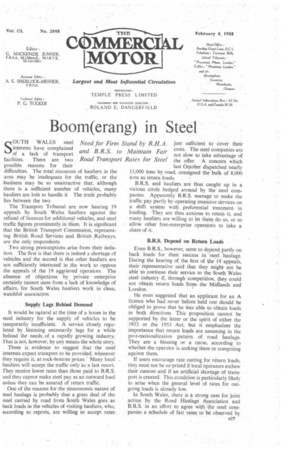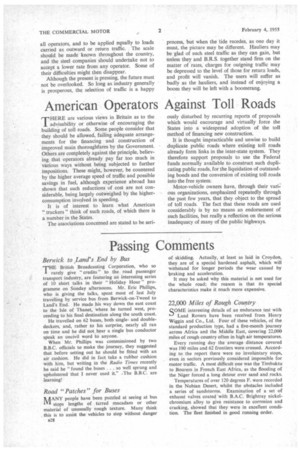Boom(erang) in Steel s OUTH WALES steel interests have complained of
Page 35

Page 36

If you've noticed an error in this article please click here to report it so we can fix it.
a lack of transport facilities. There are two possible reasons for their difficulties. The total resources of hauliers in the area May be inadequate for the traffic, or the .business may be so unattractive that, although there is a sufficient number of vehicles, many hauliers are loth to handle it The truth probably lies between the two.
The Transport Tribunal are now hearing 19 appeals by South Wales hauliers against the refusal of licences for additional vehicles, and steel traffic figures prominently in them. It is significant that the British Transport Commission, representing British Road Services and British Railways. are the only respondents.
Two strong presumptions arise from their isolation. The first is that there is indeed a shortage of vehicles and the second is that other hauliers are not sufficiently interested in the work to oppose the appeals of the 19 aggrieved operators. The absence of objections by private enterprise certainly Cannot stem from a lack of knowledge of affairs, for South Wales hauliers work in close, watchful association.
Supply Lags Behind Demand It would be natural at the time of a boom in the steel industry for the supply of vehicles to be temporarily insufficient. A service closely regulated by licensing necessarily lags for a while behind the needs of a rapidly growing industry. That is not, however, by any means the whole story.
There is evidence to suggest that the steel interests expect transport to be provided, whenever they require it, atsrock-bottom prices.' Many local hauliers will accept the traffic only as a last resort. They receive lower rates than those paid to B.R.S. and they capnot make steel pay as an outward load unless they can be assured of return traffic.
One of the reasons for the Uneconomic nature of steel haulage is probably that a great deal of the steel carried by road from South Wales goes as back loads in the vehicles of visiting hullers, who, according to reports, are willing to accept rates rand by R.H.A. just sufficient to cover their costs. The steel companies are not slow to take advantage of the offer. A concern which last October dispatched nearly 13,000 tons by road, consigned the bulk of 8,000 tons as return loads.
B.R.S. and hauliers are thus caught up in a vicious circle hedged around by the steel companies. Apparently B.R.S. manage to make the traffic pay partly by operating intensive services on a shift system with preferential treatment in loading. They are thus anxious to retain it, and many hauliers are willing to let them do so, or to allow other free-enterprise operators to take a share of it.
Maintain Rates for Fair Steel
B.R.S. Depend on Retutn Loads Even B.R.S., however, seem to depend partly on back loads for their success in steel haulage. During the hearing of the first of the 19 appeals, their representative said that they might not be able to continue their service to the South Wales steel industry if, through competition, they could not obtain return loads from the Midlands and London.
He even suggested that an applicant for an A licence who had never before held one should be obliged to prove that he was able to obtain loads in both directions This proposition cannot be .supported by the letter or the spirit of either the • 1933 or the 1953 Act, but it emphasizes the importance that return loads are assuming in the post-nationalization pattern of road haulage. They are a blessing or a curse, according to whether the operator is seeking them or competing against them.
If users encourage rate cutting for return loads, they must-not he surprised if local operators eschew their custom and if an artificial shortage of transport is created. This condition is particularly likely to arise when the general level of rates for outgoing loads is already low.
In South Wales, there is a strong case for joint actio.n by the Road Haulage Association and B.R.S. in an effort to agree with the steel companies a schedule of fair rates to be observed by all operators, and to be applied equally to loads carried as outward or return traffic. The scale should be made known throughout the country, and the steel companies should undertake not to accept a lower rate from any operator. Some of their difficulties might then disappear.
Although the present is pressing, the future must not be overlooked. So long as industry generally is prosperous, the selection of traffic is a happy process, but when the tide recedes, as one day it must, the picture may be different. Hauliers may be glad of such steel traffic as they can gain, but unless they and B.R.S. together stand firm on the matter of rates, charges for outgoing traffic may be depressed to the level of those for return loads, and profit will vanish. The users will suffer as badly as the hauliers, and instead of enjoying a boom they will be left with a boomerang.




















































































































